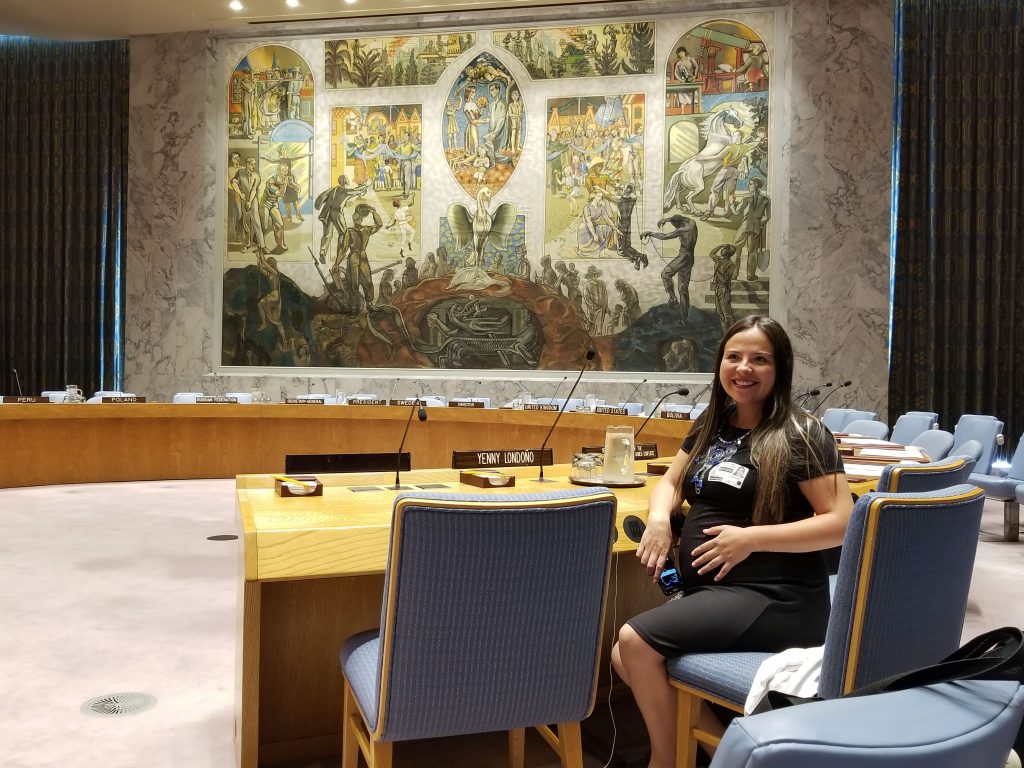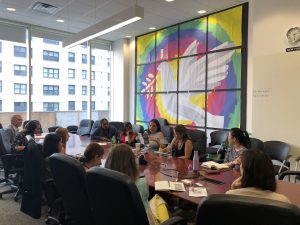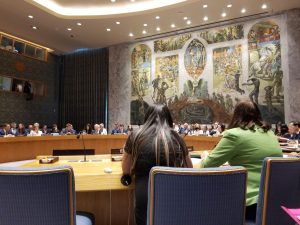 On July 9, 2018, Colombian child rights advocate Ms. Yenny Londoño briefed the UN Security Council at its Open Debate on Children and Armed Conflict (CAC). A former child soldier herself, Yenny provided targeted recommendations to UN Member States to strengthen the protection of children’s rights in conflict, including access to education, health care, housing, and other opportunities, as a way to prevent recruitment and other grave violations; strengthened reintegration and rehabilitation programs for children affected by armed conflict, including specialized attention to address the needs of girls; protection of schools; and treatment of children first and foremost as victims.
On July 9, 2018, Colombian child rights advocate Ms. Yenny Londoño briefed the UN Security Council at its Open Debate on Children and Armed Conflict (CAC). A former child soldier herself, Yenny provided targeted recommendations to UN Member States to strengthen the protection of children’s rights in conflict, including access to education, health care, housing, and other opportunities, as a way to prevent recruitment and other grave violations; strengthened reintegration and rehabilitation programs for children affected by armed conflict, including specialized attention to address the needs of girls; protection of schools; and treatment of children first and foremost as victims.
Yenny was forcibly recruited by the Fuerzas Armadas Revolucionarias de Colombia – Ejército del Pueblo (FARC-EP) when she was 13 years old, and in 2014, she represented child victims of recruitment and use at peace negotiations between the Colombian government and the FARC-EP. Yenny continues to advocate for conflict-affected children and youth in Colombia, including as part of a Group of Youth Advisers sponsored by Benposta Nación de Muchachos. A member of Watchlist’s longtime partner the Coalition against the Involvement of Children and Youth in the Colombian Armed Conflict (COALICO), Benposta provides support to marginalized children and youth, including those formerly associated with armed groups.
In the days following the Open Debate, Watchlist and the Office of the Special Representative of the UN Secretary-General for Children and Armed Conflict (OSRSG-CAAC) co-organized a series of briefings for Yenny with select Member States, UN offices, and New York-based civil society. In these meetings, Yenny and Watchlist highlighted some of the current concerns affecting children in Colombia, including ongoing recruitment and use by the Ejército de Liberación Nacional (ELN), the Ejército Popular de Liberación (EPL), FARC-EP dissidents, and other armed groups; inadequate access to basic services such as education, health care, and housing; and insecurity due to activity by criminal and armed groups.
The visit was especially timely, ahead of the Security Council’s July 26 meeting on the situation in Colombia. Yenny urged Council Members to continue to closely monitor the implementation of the peace accord, particularly those provisions related to children’s rights. She highlighted the need for clarity regarding implementation of the Special Jurisdiction for Peace (known by its Spanish acronym JEP), particularly how it will deal with demobilized youth who were recruited as children but have recently or will soon turn 18. She underscored the importance of treating these individuals primarily as victims, while complying with international juvenile justice standards in cases where they may have committed crimes.
 Yenny’s visit happened to coincide with the High-Level Political Forum (HLFP) on sustainable development and the attendant visit by youth representatives from a number of countries. Two child delegates from Mexico and the Dominican Republic joined a civil society briefing, during which Yenny described the hardships she endured as a child soldier and during her reintegration into society, and how she overcame these to become a child rights advocate.
Yenny’s visit happened to coincide with the High-Level Political Forum (HLFP) on sustainable development and the attendant visit by youth representatives from a number of countries. Two child delegates from Mexico and the Dominican Republic joined a civil society briefing, during which Yenny described the hardships she endured as a child soldier and during her reintegration into society, and how she overcame these to become a child rights advocate.
“Today, I feel a responsibility to speak up for the many children who don’t have a voice and to do something to change the situation, so they don’t have to experience what I did as a child,” Yenny told the young aspiring advocates. “It’s inspiring to see youth like you at the UN, giving a voice to children less fortunate than yourselves, who might otherwise remain voiceless.”
Read Watchlist and COALICO’s joint press release on the 2018 CAC Open Debate and Yenny’s visit at https://watchlist.org/wp-content/uploads/watchlist-press-release-on-open-debate-final.pdf.
Remarks to the UN Security Council by Ms. Yenny Londoño
The following remarks are an excerpt from the official UN transcript of the July 9, 2018, Open Debate on Children and Armed Conflict. The remarks were delivered in Spanish and what follows is a translation prepared by the United Nations Translation Services.
Ms. Londoño (spoke in Spanish): First of all, I am grateful for the opportunity that the Security Council has given us to participate in such an important forum. I express special thanks go to the Government of Sweden, which invited us and helped us travel from Colombia, as well as to the Special Representative of the Secretary-General for Children and Armed Conflict.
I am speaking in the first person plural as I am representing the Group of Young Consultants on Childhood, Adolescence and Armed Conflict, and I am also speaking on behalf of children and adolescents who are tragically experiencing recruitment and exploitation by armed groups and grave violations of their rights in various parts of the world.
Under the slogan “Our Voices Count”, the Group of Young Consultants was spawned by an initiative of the civil society organization Benposta and relies on the support of the European Union, which has joined in recognizing, supporting and encouraging other organizations, such as Oxfam International, Humanidad Vigente and the Coalition Against Involving Children in Armed Conflict in Colombia and the Watchlist on Children and Armed Conflict in New York. In my particular case, I joined the Fuerzas Armadas Revolucionarias de Colombia-Ejército del Pueblo (FARC-EP) at the age of 13. I cut ties with the latter in very strange circumstances after having seen combat, and subsequently went through various programmes. Today I am pursuing a law degree and I am currently in my ninth semester. In 2014, I had the opportunity to travel to Havana and participate as a victim of recruitment in a delegation at talks between the Colombian Government and the FARC-EP.
I am grateful to the countries represented in the Chamber for their representatives’ willingness to listen, as my message is mainly addressed to States, which are responsible for developing and implementing policies aimed at the prevention and protection of children and adolescents.
As the Secretary-General states in his recent report: “Preventing violations against children affected by conflict should be a primary concern of the international community … We must do more to address this challenge by ensuring that child protection is made an integral part of any comprehensive strategy to prevent and resolve conflict in view of enabling sustainable peace and by promoting the close involvement of children during the development of such strategies.” (S/2018/465, para. 11) In that regard, I am speaking as an advocate for the following recommendations.
It is essential that the root causes that compelled us to join such groups be resolved, as most of our pasts have been marked by the violation of our rights, including access to education, health care, housing, employment, our families’ livelihoods, security, participation in cultural life and sports and recreation, among others. We are deeply concerned that the failure to change the social and economic conditions of our families and communities seriously hinders our social integration, thereby giving way to our constant temptation to rejoin those groups. We therefore underscore that the best way to prevent the recruitment of children is by guaranteeing their rights on the ground. Similarly, Governments must ensure the relevant security conditions to protect our physical, personal and psychological integrity. Unfortunately, many children who have disassociated themselves from such groups are currently facing problems, including the threats that they receive when they return to their local areas, and, often times, institutional support from the Government is scarce or non-existent.
It is also essential that, in the various phases of the process of reintegration, we be given the opportunity to express our opinion and decide our lives, thereby ensuring our participation in developing and implementing public policies related to our rights. Educational programmes involving psychological support, skills acquisition and comprehensive training must consider our particularities and include a gender and ethnic approach that allows us to exercise our right to integration, social inclusion, education and housing, among others, in decent conditions, while respecting our professional aspirations.
It is important to address the specific needs of girls in developing reintegration programmes, given that the way in which we are affected is different from that of boys. It must be remembered that, in terms of reintegration, there is no one-size-fits-all approach to every case. We also recommend that our families be included and, in as much as possible, participate in the reintegration process, while trying to repair, rebuild and strengthen the bonds between them and the community.
It is worrisome that schools and educational centres are being affected and/or occupied by armed actors, thereby seriously affecting the learning process of children and their and their teachers and professors’ physical integrity. In that regard, we ask Governments that have not yet signed the Safe Schools Declaration to do so, and we have been waiting on a deferred response from Colombia, among other countries, since 2015.
We call on Governments to fulfil their commitments regarding children and adolescents, including their right to be treated as victims and thereby entitled to full reparations. In situations of conflict, when they are implicated in the actions of armed groups, many children are treated as delinquents and are unable to acquire the status of crime victims and included in Government protection programmes for children. On the contrary, we wind up in detention centres. It is worth highlighting that Colombia has enacted the victims’ law, which constitutes an advanced and sophisticated legal framework for the protection of victims. That framework can contribute to the exchange of good practices and lessons learned among countries that face similar problems so as to ensure that all children are treated primarily as victims.
Lastly, concerning full reparations, unfortunately, several of our colleagues, after having left the group more than 10 years ago and been acknowledged as disassociated from it, have yet to receive the resources due to them within the framework of the victims law in Colombia. It is therefore important that all State actors uphold their commitments with regard to children and adolescent victims at risk. If that is not done, their life ambitions will be seriously affected. In addition, they will be re-victimized and remain at risk.

Once again, we are grateful that the voice of children and adolescent victims of armed conflict has been heard in this forum, and we hope that they will be considered. We ask that Governments not see us as a problem, but provide us with an opportunity to demonstrate to them our proactive abilities, embodied by such entities as the Group of Young Consultants in Colombia and what we are doing. I want to underscore the happiness that I feel in sharing with everyone present the experience that I underwent for 13 years during my association with the FARC-EP. The reality is that many of us live in very remote areas in which there is no State presence, and therefore run the risk of undergoing such experiences. It is not fair for children to be seen as a sacrifice or crime, rather than as a hope for the future. Given that I am currently pregnant, I think I have the additional responsibility of changing both my world and my daughter’s, so that she can live in a better world. While that is my responsibility, I believe that everyone here has the tools to help shape the lives other children who do not have a voice.



